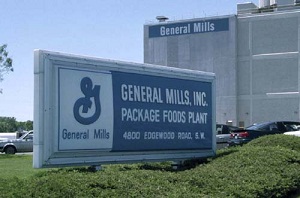General Mills installs solar
 A nice bowl of lucky charms will always satisfy the sweetest of teeth and still leave you with a little nutrition. But General Mills makes a lot more than just breakfast cereal. Everything from Old El Paso taco shells to Haagen-Dazs ice cream is produced in General Mills facilities, and. as it turns out, a few of their factories are as green as the jolly giant who’s on their frozen pea labels.
A nice bowl of lucky charms will always satisfy the sweetest of teeth and still leave you with a little nutrition. But General Mills makes a lot more than just breakfast cereal. Everything from Old El Paso taco shells to Haagen-Dazs ice cream is produced in General Mills facilities, and. as it turns out, a few of their factories are as green as the jolly giant who’s on their frozen pea labels.
On July 29, 2010, the town of Methuen, MA, officially became home to the first ever General Mills facility to produce its own energy via solar panels. By utilizing the sun, the warehouse will capture enough light to provide for nearly 80 percent of its electricity in the summer months, and about 40 percent of its needs the rest of the year.
The completion of the project is just one in a line of what will soon be a string of General Mills factories to adopt “green” energy solutions.
“The enthusiasm of the work force and the partnership with state and local government led the way for us to install the solar panels,” said Jon Russett, energy manager of General Mills' supply chain operations in a press release for Space Daily. “General Mills is committed to continuously improving its environmental performance.”
By installing solar panels, the warehouse, which produces and stores Yoplait yogurt, will be able to generate roughly 55 percent of its overall energy demand and offset nearly 112,000 pounds of carbon dioxide emissions annually.
General Mills’ commitment to sustainable energy solutions hasn’t gone unnoticed.
“MassCEC is thrilled to see forward thinking companies such as General Mills reducing their carbon footprint and helping lessen our dependence on fossil fuels," said Patrick Cloney, Executive Director of the Massachusetts Clean Energy Center (MassCEC), which awarded General Mills a rebate for the solar panel installation.
Although the new upgrade for the Methuen facility is a refreshing take on sustainable consumption practices, it’s not the last “green” project for General Mills.
In Fridley, MN, General Mills will be adopting a biomass burner, which uses left over oat hull waste product to generate about 90 percent of the steam needed to heat and power the plant.
“As we continue to work on sustainability across our supply chain, we remain confident that the groundwork we've laid will continue to show even more progress in the future,” said Russet.



